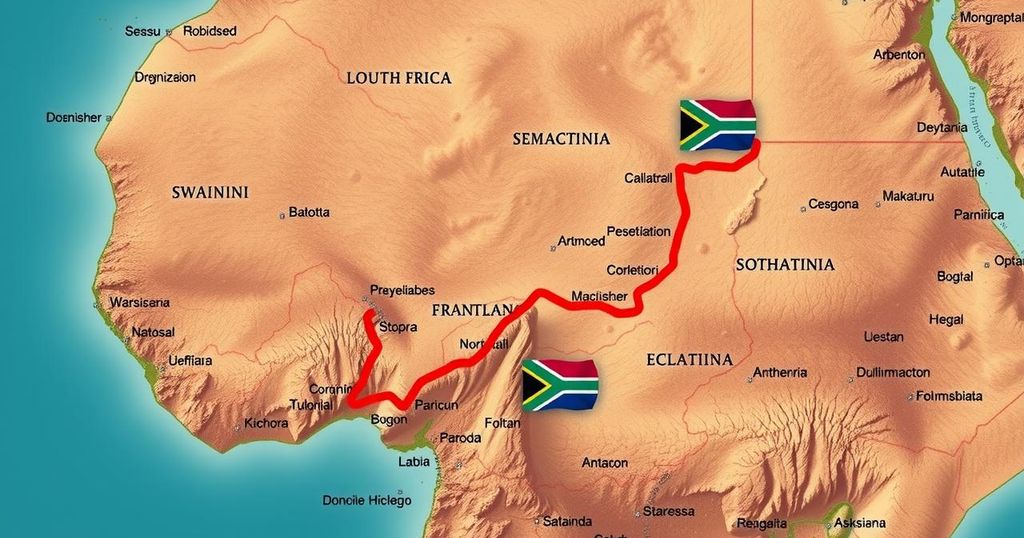Politics
AFRICA, AN, BORDER POST, CORRUPTION, DANIEL CHAPO, DEMOCRACY, ESWATINI, FRELIMO, JOHANNESBURG, LEEBOMBO, LEVY NDOU, MANANGA, MAPUTO, MBABANE, MICHAEL MASIAPATO, MONDLANE, MOZAMBIQUE, POLICE DEPLOYMENT, REGIONAL COOPERATION, SADC, SECURITY, SOUTH AFRICA, TSHWANE UNIVERSITY OF TECHNOLOGY
Isaac Bennett
0 Comments
South Africa Redirects Trade to Eswatini Amid Mozambique’s Political Unrest
Amidst a political crisis in Mozambique following a disputed election, violence has escalated, leading South Africa to reroute trade and travel to Eswatini’s Mananga Border Post. The ongoing turmoil poses significant challenges for border authorities and raises concerns regarding regional security. Analysts remain cautiously optimistic about dialogues facilitated by South Africa and other nations, emphasizing the need for stability in Mozambique and the broader Southern African region.
In the wake of escalating violence and political unrest following a disputed election in Mozambique, South Africa has redirected trade and travel from the Leebombo Border Post to the Mananga Border Post in Eswatini. This shift aims to provide a safer passage for individuals seeking to cross the border amid the turmoil in Mozambique. Michael Masiapato, the commissioner of South Africa’s Border Management Authority, acknowledged the challenges posed by the ongoing crisis despite the presence of military and police forces intended to maintain order. He remarked, “Even… when they deploy the military and when they deploy police officers on the corridor, it is not able to cover each and every area.”
The violent protests in Mozambique, ignited by the contentious presidential election won by Daniel Chapo, have resulted in numerous casualties. Analysts warn that this instability could threaten regional security and economic growth due to potential increases in criminal activities and arms proliferation. Political analyst Solomon Mondlane expressed cautious optimism regarding the international community’s efforts, stating, “The situation is volatile. The good news is we’re hearing more calls from different countries calling for more dialogue.” He noted South Africa’s readiness to facilitate discussions between the conflicting parties, recognizing the importance of dialogue in restoring peace.
Moreover, Levy Ndou, a political analyst at Tshwane University of Technology, emphasized the significance of regional cooperation, suggesting that should the situation worsen, intervention from the Southern African Development Community (SADC) may become necessary to restore stability and facilitate economic activities. Zimbabwean President Emmerson Mnangagwa, as SADC chair, affirmed that the organization stands ready to assist Mozambique during this crisis.
Overall, the redirecting of trade routes due to the violence in Mozambique underscores the urgent need for diplomatic engagement and regional stability.
The flow of trade and travel is influenced greatly by national stability, and the situation in Mozambique illustrates how political crises can have wider ramifications across borders. The collaboration among regional powers may provide a pathway toward resolution and peace, yet the challenges remain formidable in the face of persistent unrest.
The political crisis in Mozambique has been instigated by a disputed national election that resulted in violent protests, creating a hazardous environment at the border with South Africa. This situation has prompted authorities to divert trade and travel routes to Eswatini, highlighting the interconnectedness of regional stability and economic activities. The involvement of international and regional bodies like the SADC further contextualizes the ongoing efforts to mitigate the crisis and restore peace in Mozambique.
In summary, the escalating violence in Mozambique has necessitated a strategic redirection of trade and travel to Eswatini, underscoring the urgency of addressing the political crisis. The responses from both regional and international stakeholders signify a collective commitment to restore dialogue and stability in Mozambique. As the situation develops, the importance of continued diplomatic efforts cannot be overstated in ensuring the peace and economic revitalization of the region.
Original Source: www.voazimbabwe.com




Post Comment